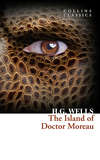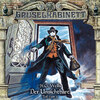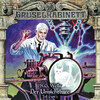Buch lesen: «The Island of Doctor Moreau»
THE ISLAND OF DOCTOR MOREAU
H. G. Wells

Copyright
William Collins
An imprint of HarperCollinsPublishers
1 London Bridge Street,
London SE1 9GF
This eBook edition published by William Collins in 2017
Life & Times section © HarperCollinsPublishers Ltd
Silvia Crompton asserts her moral right as author of the Life & Times section
Classic Literature: Words and Phrases adapted from
Collins English Dictionary
Cover by e-Digital Design
Cover illustration: © iStock
A catalogue record for this book is available from the British Library
All rights reserved under International and Pan-American Copyright Conventions. By payment of the required fees, you have been granted the non-exclusive, non-transferable right to access and read the text of this e-book on-screen. No part of this text may be reproduced, transmitted, down-loaded, decompiled, reverse engineered, or stored in or introduced into any information storage and retrieval system, in any form or by any means, whether electronic or mechanical, now known or hereinafter invented, without the express written permission of HarperCollins
Source ISBN: 9780008190057
Ebook Edition © January 2017 ISBN: 9780008190064
Version: 2017-01-03
Contents
Cover
Title Page
Copyright
History of William Collins
Life & Times
Introduction
1. In the Dinghy of the Lady Vain
2. The Man Who Was Going Nowhere
3. The Strange Face
4. At the Schooner’s Rail
5. The Man Who Had Nowhere to Go
6. The Evil-Looking Boatmen
7. The Locked Door
8. The Crying of the Puma
9. The Thing in the Forest
10. The Crying of the Man
11. The Hunting of the Man
12. The Sayers of the Law
13. A Parley
14. Doctor Moreau Explains
15. Concerning the Beast Folk
16. How the Beast Folk Taste Blood
17. A Catastrophe
18. The Finding of Moreau
19. Montgomery’s ‘Bank Holiday’
20. Alone with the Beast Folk
21. The Reversion of the Beast Folk
22. The Man Alone
Footnotes
Classic Literature: Words and Phrases
About the Publisher
History of William Collins
In 1819, millworker William Collins from Glasgow, Scotland, set up a company for printing and publishing pamphlets, sermons, hymn books, and prayer books. That company was Collins and was to mark the birth of HarperCollins Publishers as we know it today. The long tradition of Collins dictionary publishing can be traced back to the first dictionary William co-published in 1825, Greek and English Lexicon. Indeed, from 1840 onwards, he began to produce illustrated dictionaries and even obtained a licence to print and publish the Bible.
Soon after, William published the first Collins novel; however, it was the time of the Long Depression, where harvests were poor, prices were high, potato crops had failed, and violence was erupting in Europe. As a result, many factories across the country were forced to close down and William chose to retire in 1846, partly due to the hardships he was facing.
Aged 30, William’s son, William II, took over the business. A keen humanitarian with a warm heart and a generous spirit, William II was truly ‘Victorian’ in his outlook. He introduced new, up-to-date steam presses and published affordable editions of Shakespeare’s works and The Pilgrim’s Progress, making them available to the masses for the first time.
A new demand for educational books meant that success came with the publication of travel books, scientific books, encyclopedias, and dictionaries. This demand to be educated led to the later publication of atlases, and Collins also held the monopoly on scripture writing at the time.
In the 1860s Collins began to expand and diversify and the idea of ‘books for the millions’ was developed, although the phrase wasn’t coined until 1907. Affordable editions of classical literature were published, and in 1903 Collins introduced 10 titles in their Collins Handy Illustrated Pocket Novels. These proved so popular that a few years later this had increased to an output of 50 volumes, selling nearly half a million in their year of publication. In the same year, The Everyman’s Library was also instituted, with the idea of publishing an affordable library of the most important classical works, biographies, religious and philosophical treatments, plays, poems, travel, and adventure. This series eclipsed all competition at the time, and the introduction of paperback books in the 1950s helped to open that market and marked a high point in the industry.
HarperCollins is and has always been a champion of the classics, and the current Collins Classics series follows in this tradition – publishing classical literature that is affordable and available to all. Beautifully packaged, highly collectible, and intended to be reread and enjoyed at every opportunity.
Life & Times
About the Author
When we think of H. G. Wells, we think of ground-breaking science fiction, alien life forms, prophetic man-made contraptions and intergalactic warfare. His was a mind capable not only of imagining things that were literally out of this world, but also of prophesying how mankind’s flaws might turn these apocalyptic visions into everyday reality. Most remarkable of all, it was a mind that had grown from notably ordinary beginnings.
Herbert George Wells was born in 1866 in the London suburb of Bromley, where his father, a part-time professional cricketer, owned an unsuccessful sporting-goods shop. The family struggled financially, particularly after a leg injury terminated Wells’ father’s cricketing career, and at the age of fourteen Herbert had to leave school in order to earn his keep.
For four years, Wells moved from one fruitless apprenticeship to the next, before being offered the lifeline of a return to education. He had developed a love of literature during his youth, but now, thanks to a scholarship to the Royal College of Science in London, he was able to indulge his other passion: biology. One of his teachers there was the eminent anatomist T. H. Huxley, nicknamed ‘Darwin’s Bulldog’ for his outspoken support for Charles Darwin’s controversial theory of evolution. (Perhaps coincidentally, Huxley’s grandson Aldous would also go on to become an acclaimed science-fiction writer.)
Interesting Times
Alongside Huxley’s influence, Wells developed an interest in divisive topics as a member of the student debating society. And, without doubt, he was living in interesting times. By the 1880s, the notorious rigidity of Victorian society was giving way to contentious questions about evolution, religion and equality, and Wells soon became an outspoken critic of the social status quo. He felt society could be better and stronger – essentially, more evolved. He took an early interest in the newly established Fabian Society, a socialist organisation that was subsequently instrumental in founding the British Labour Party, and which included among its members satirical dramatist G. B. Shaw and suffragette Emmeline Pankhurst.
In the early years of the twentieth century, Wells fell out very publicly with the Fabians, accusing them of being an ineffectual ‘drawing-room society’ with ‘scattered members’. He wanted them to take a more gung-ho attitude to social reform, and thereby to rally new members to the cause. They in turn were embarrassed by his unconventional private life: he was twice-married and promiscuous, and had both legitimate and illegitimate children. Wells ultimately left the group in frustration, but in the meantime his mind had been awoken to the possibility that life on earth could quite easily become either immeasurably better or immeasurably worse, visions he elaborated upon in his fictional output during these early years of his political engagement.
Scientific Romance
H. G. Wells’ first book was his 1893 Textbook of Biology, which drew on his time as a science teacher, but just two years later he produced a debut novel that made him a household name and popularised a whole new genre of fiction. The Time Machine (1895) is the story of a scientist who travels to the very distant future, where he discovers that the division between rich and poor that was entrenched in nineteenth-century society has led to mankind splitting into two distinct species. The novel was a thinly veiled warning based on Wells’ political views, but its remarkable claim to fame is that it popularised the concept of ‘time travel’ by ‘time machine’: both terms coined by Wells, and now considered staples of science fiction.
Nineteenth-century literature, propelled in part by the swift technological advances of the Industrial Revolution, had seen a gradual shift from Gothic horror – with its ghost stories and vampires – to novels that dealt with man-made futuristic inventions. Mary Shelley’s Frankenstein (1818) is now considered an early work of science fiction, but the genre came into its own in 1864 with the publication of Jules Verne’s Journey to the Centre of the Earth. Verne dominated the genre for the next two decades, but the 1890s belong firmly to H. G. Wells. Following his success with The Time Machine, Wells published, in quick succession, bestsellers including The Island of Doctor Moreau (1896), The Invisible Man (1897) and The War of the Worlds (1898). Both he and Jules Verne have subsequently been declared ‘The Father of Science Fiction’, even if, in their day, the genre was more commonly known as scientific romance.
Wells’ novels of the 1890s pushed the boundaries of scientific imagination, making fantastical notions such as genetic engineering, invisibility and extraterrestrial life forms seem alarmingly real. The War of the Worlds boasts some of the earliest fictional ‘Martians’ and describes the as-yet-uninvented laser, cornerstones too of modern science fiction. But beneath the surface, these novels continued to present nightmarish visions of a future defined by selfishness, inequality and conflict: qualities Wells hoped humankind might yet do away with.
The Island of Doctor Moreau
While many of Wells’ novels deal in the fantastical or extraterrestrial, the power of The Island of Doctor Moreau lies in its horrible realism. It may be set on an unknown island in the middle of nowhere, but its characters are very much beasts of this world, albeit grotesquely altered by the most beastly character of them all: a scientist hell-bent on fashioning humans out of animals.
Wells’ antihero, the evil genius Doctor Moreau, was not conjured from thin air. At the time of the novel’s publication, vivisection was a highly contentious topic in Britain. A series of laws had come into force during the nineteenth century aimed at regulating animal experimentation and reducing animal cruelty, but campaigners remained dissatisfied – to the extent that, even a decade later, London was gripped by a series of running battles between protesters and medical students over the issue of vivisection.
Meanwhile, inspired in part by the work of Charles Darwin, there was also much intellectual debate about the possibility of human devolution – a slide backwards into brutishness rather than towards perfection – which was fast becoming a subject of particular interest to H. G. Wells. His first novel, The Time Machine, had imagined a future in which mankind had split into two separate but equally despicable species. Now, in a wry nod to his own position as an observer of human degeneration, Wells imbued The Island’s helpless narrator, Edward Prendick, with certain autobiographical details. Upon meeting Dr Moreau, Prendick announces that he ‘had spent some years at the Royal College of Science, and had done some researches in biology under Huxley’.
The great problem for both Prendick and Wells, however, is that human devolution, once seen for what it is, cannot be unseen. Prendick returns to so-called civilisation in ‘well-nigh insupportable’ horror at his fellow men, whom he can no longer view as anything other than animals in temporary disguise. ‘It seemed that I too was not a reasonable creature,’ Prendick mourns, ‘but only an animal tormented with some strange disorder in its brain which sent it to wander alone.’
Paradise Lost
For all the dystopian horror of his most famous novels, Wells was, in his predictions for mankind’s future, an optimist – initially, at least. He felt at heart that humanity was on the brink of something wonderful. His 1901 work Anticipations of the Reaction of Mechanical and Scientific Progress upon Human Life and Thought set out a vision of the future in which warfare was obsolete, nations having synthesised into large peaceful blocs that treated one another with ‘intelligent sympathy’. He predicted that, by the end of the twentieth century, this social revolution would have forever assured ‘the final peace of the world’.
The First World War shook his belief, although Wells remained convinced that the reality of all-out warfare might yet sober mankind into long-term peace. In his Outline of History (1920), he defined human history as ‘more and more a race between education and catastrophe’, but predicted that progress would prevail, be it ‘clumsily or smoothly’.
By the outbreak of the Second World War – which he had predicted with eerie accuracy in his 1933 novel The Shape of Things to Come – Wells was less optimistic. It is apt that his final work, composed in 1945 and foreseeing the collapse and destruction of humanity, was entitled Mind at the End of Its Tether. He felt he had given ample warnings that had gone unheeded. Indeed, reflecting in 1941 on predictions he had made that had come horribly true, Wells suggested that his epitaph should simply read: ‘I told you so. You damned fools.’ When the end came, in 1946, his ashes were scattered at sea.
INTRODUCTION
On February the First 1887, the Lady Vain was lost by collision with a derelict when about the latitude 1 degree S. and longitude 107 degrees W.
On January the Fifth, 1888—that is eleven months and four days after—my uncle, Edward Prendick, a private gentleman, who certainly went aboard the Lady Vain at Callao, and who had been considered drowned, was picked up in latitude 5 degrees 3’ S. and longitude 101 degrees W. in a small open boat of which the name was illegible, but which is supposed to have belonged to the missing schooner Ipecacuanha. He gave such a strange account of himself that he was supposed demented. Subsequently he alleged that his mind was a blank from the moment of his escape from the Lady Vain. His case was discussed among psychologists at the time as a curious instance of the lapse of memory consequent upon physical and mental stress. The following narrative was found among his papers by the undersigned, his nephew and heir, but unaccompanied by any definite request for publication.
The only island known to exist in the region in which my uncle was picked up is Noble’s Isle, a small volcanic islet and uninhabited. It was visited in 1891 by H. M. S. Scorpion. A party of sailors then landed, but found nothing living thereon except certain curious white moths, some hogs and rabbits, and some rather peculiar rats. So that this narrative is without confirmation in its most essential particular. With that understood, there seems no harm in putting this strange story before the public in accordance, as I believe, with my uncle’s intentions. There is at least this much in its behalf: my uncle passed out of human knowledge about latitude 5 degrees S. and longitude 105 degrees E., and reappeared in the same part of the ocean after a space of eleven months. In some way he must have lived during the interval. And it seems that a schooner called the Ipecacuanha with a drunken captain, John Davies, did start from Africa with a puma and certain other animals aboard in January, 1887, that the vessel was well known at several ports in the South Pacific, and that it finally disappeared from those seas (with a considerable amount of copra aboard), sailing to its unknown fate from Bayna in December, 1887, a date that tallies entirely with my uncle’s story.
CHARLES EDWARD PRENDICK.
CHAPTER 1
In the Dinghy of the Lady Vain
I do not propose to add anything to what has already been written concerning the loss of the Lady Vain. As everyone knows, she collided with a derelict when ten days out from Callao. The longboat, with seven of the crew, was picked up eighteen days after by H. M. gunboat Myrtle, and the story of their terrible privations has become quite as well known as the far more horrible “Medusa” case. But I have to add to the published story of the Lady Vain another, possibly as horrible and far stranger. It has hitherto been supposed that the four men who were in the dinghy perished, but this is incorrect. I have the best of evidence for this assertion: I was one of the four men.
But in the first place I must state that there never were four men in the dinghy,—the number was three. Constans, who was “seen by the captain to jump into the gig,”fn1 luckily for us and unluckily for himself did not reach us. He came down out of the tangle of ropes under the stays of the smashed bowsprit, some small rope caught his heel as he let go, and he hung for a moment head downward, and then fell and struck a block or spar floating in the water. We pulled towards him, but he never came up.
I say luckily for us he did not reach us, and I might almost say luckily for himself; for we had only a small breaker of water and some soddened ship’s biscuits with us, so sudden had been the alarm, so unprepared the ship for any disaster. We thought the people on the launch would be better provisioned (though it seems they were not), and we tried to hail them. They could not have heard us, and the next morning when the drizzle cleared,—which was not until past midday,—we could see nothing of them. We could not stand up to look about us, because of the pitching of the boat. The two other men who had escaped so far with me were a man named Helmar, a passenger like myself, and a seaman whose name I don’t know,—a short sturdy man, with a stammer.
We drifted famishing, and, after our water had come to an end, tormented by an intolerable thirst, for eight days altogether. After the second day the sea subsided slowly to a glassy calm. It is quite impossible for the ordinary reader to imagine those eight days. He has not, luckily for himself, anything in his memory to imagine with. After the first day we said little to one another, and lay in our places in the boat and stared at the horizon, or watched, with eyes that grew larger and more haggard every day, the misery and weakness gaining upon our companions. The sun became pitiless. The water ended on the fourth day, and we were already thinking strange things and saying them with our eyes; but it was, I think, the sixth before Helmar gave voice to the thing we had all been thinking. I remember our voices were dry and thin, so that we bent towards one another and spared our words. I stood out against it with all my might, was rather for scuttling the boat and perishing together among the sharks that followed us; but when Helmar said that if his proposal was accepted we should have drink, the sailor came round to him.
I would not draw lots however, and in the night the sailor whispered to Helmar again and again, and I sat in the bows with my clasp-knife in my hand, though I doubt if I had the stuff in me to fight; and in the morning I agreed to Helmar’s proposal, and we handed halfpence to find the odd man. The lot fell upon the sailor; but he was the strongest of us and would not abide by it, and attacked Helmar with his hands. They grappled together and almost stood up. I crawled along the boat to them, intending to help Helmar by grasping the sailor’s leg; but the sailor stumbled with the swaying of the boat, and the two fell upon the gunwale and rolled overboard together. They sank like stones. I remember laughing at that, and wondering why I laughed. The laugh caught me suddenly like a thing from without.
I lay across one of the thwarts for I know not how long, thinking that if I had the strength I would drink seawater and madden myself to die quickly. And even as I lay there I saw, with no more interest than if it had been a picture, a sail come up towards me over the skyline. My mind must have been wandering, and yet I remember all that happened, quite distinctly. I remember how my head swayed with the seas, and the horizon with the sail above it danced up and down; but I also remember as distinctly that I had a persuasion that I was dead, and that I thought what a jest it was that they should come too late by such a little to catch me in my body.
For an endless period, as it seemed to me, I lay with my head on the thwart watching the schooner (she was a little ship, schooner-rigged fore and aft) come up out of the sea. She kept tacking to and fro in a widening compass, for she was sailing dead into the wind. It never entered my head to attempt to attract attention, and I do not remember anything distinctly after the sight of her side until I found myself in a little cabin aft. There’s a dim half-memory of being lifted up to the gangway, and of a big round countenance covered with freckles and surrounded with red hair staring at me over the bulwarks. I also had a disconnected impression of a dark face, with extraordinary eyes, close to mine; but that I thought was a nightmare, until I met it again. I fancy I recollect some stuff being poured in between my teeth; and that is all.
Der kostenlose Auszug ist beendet.




















